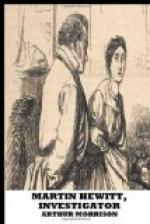Foggatt was dead, without a doubt. Probably had shot himself, the doctor thought, from the powder-blackening and other circumstances. Certainly nobody could have left the room by the door, or he must have passed my landing, while the fact of the door being found locked from the inside made the thing impossible. There were two windows to the room, both of which were shut, one being fastened by the catch, while the catch of the other was broken—an old fracture. Below these windows was a sheer drop of fifty feet or more, without a foot or hand-hold near. The windows in the other rooms were shut and fastened. Certainly it seemed suicide—unless it were one of those accidents that will occur to people who fiddle ignorantly with firearms. Soon the rooms were in possession of the police, and we were turned out.
We looked in at the housekeeper’s kitchen, where her daughter was reviving and calming Mrs. Clayton with gin and water.
“You mustn’t upset yourself, Mrs. Clayton,” Hewitt said, “or what will become of us all? The doctor thinks it was an accident.”
He took a small bottle of sewing-machine oil from his pocket and handed it to the daughter, thanking her for the loan.
* * * * *
There was little evidence at the inquest. The shot had been heard, the body had been found—that was the practical sum of the matter. No friends or relatives of the dead man came forward. The doctor gave his opinion as to the probability of suicide or an accident, and the police evidence tended in the same direction. Nothing had been found to indicate that any other person had been near the dead man’s rooms on the night of the fatality. On the other hand, his papers, bankbook, etc., proved him to be a man of considerable substance, with no apparent motive for suicide. The police had been unable to trace any relatives, or, indeed, any nearer connections than casual acquaintances, fellow-clubmen, and so on. The jury found that Mr. Foggatt had died by accident.
“Well, Brett,” Hewitt asked me afterward, “what do you think of the verdict?”
I said that it seemed to be the most reasonable one possible, and to square with the common-sense view of the case.
“Yes,” he replied, “perhaps it does. From the point of view of the jury, and on their information, their verdict was quite reasonable. Nevertheless, Mr. Foggatt did not shoot himself. He was shot by a rather tall, active young man, perhaps a sailor, but certainly a gymnast—a young man whom I think I could identify if I saw him.”
“But how do you know this?”
“By the simplest possible inferences, which you may easily guess, if you will but think.”
“But, then, why didn’t you say this at the inquest?”
“My dear fellow, they don’t want any inferences and conjectures at an inquest; they only want evidence. If I had traced the murderer, of course then I should have communicated with the police. As a matter of fact, it is quite possible that the police have observed and know as much as I do—or more. They don’t give everything away at an inquest, you know. It wouldn’t do.”




